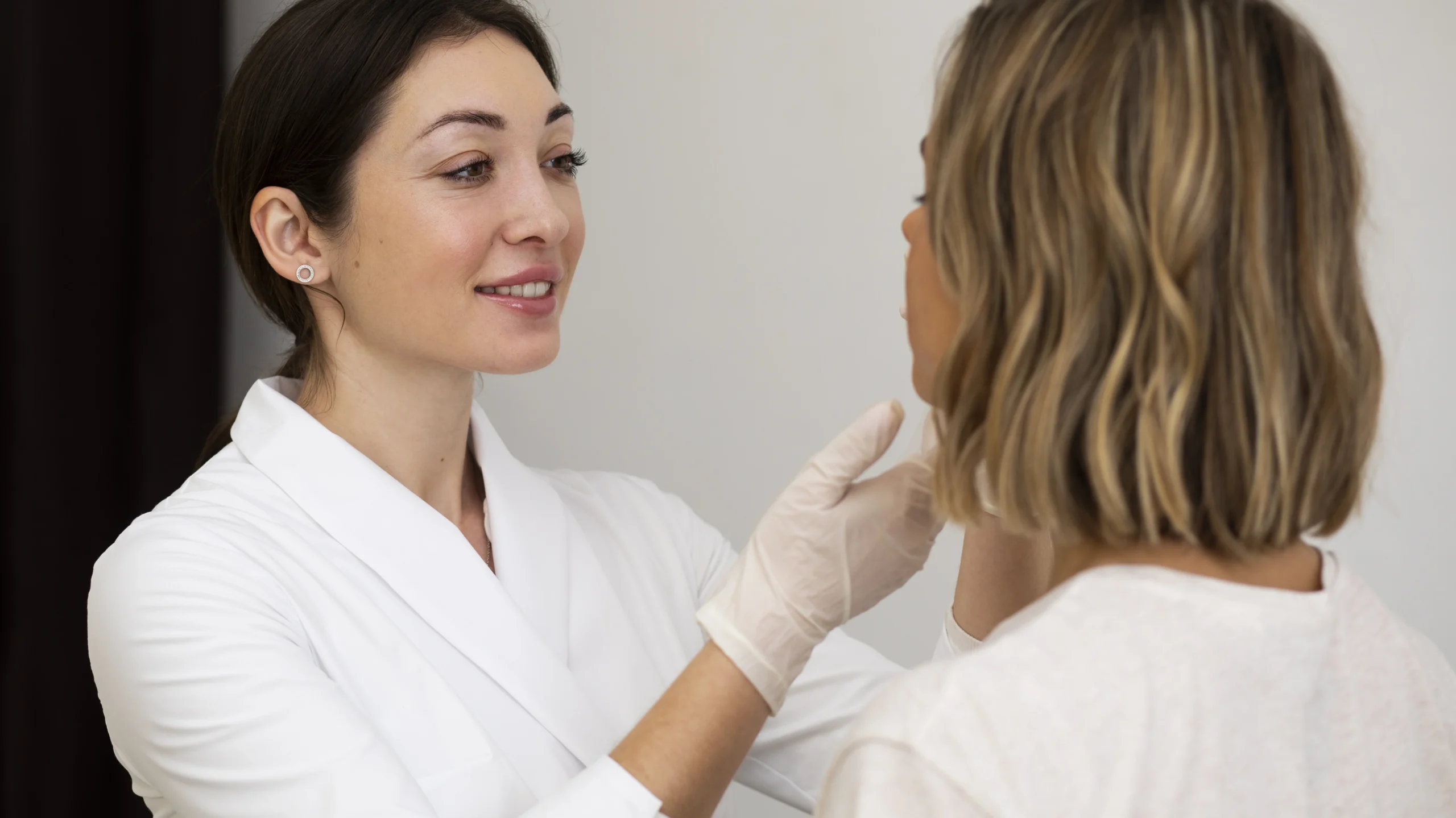Struggling with persistent breakouts? You’re not alone. Nearly 85% of people worldwide battle acne at some point in their lives. Understanding what causes acne is your first hassle-free step toward clearer skin. In this dermatologist-approved guide, we break down the science behind breakouts into actionable insights that actually work.
What Causes Acne? The Quick Science Breakdown
Wondering what causes acne in a nutshell? Acne develops when four key factors collide:
- Excess oil production (sebum)
- Clogged hair follicles from dead skin cells
- Bacterial growth (particularly C. acnes)
- Inflammation as your body responds
These elements create everything from minor blackheads to painful cystic lesions. But what triggers these factors varies widely between individuals.
PRO TIP: Identifying your specific acne triggers can cut your treatment time in half. Pay close attention to when breakouts occur and what changed in your routine.
The 4 Core Factors: What Causes Acne Development Explained
1. Excess Sebum: The Oil Factor
Your skin naturally produces oil (sebum) through sebaceous glands. This oil normally:
- Moisturizes skin
- Creates a protective barrier
- Carries dead cells to the surface
What goes wrong: Hormone fluctuations—especially androgens—can supercharge these glands, creating an oil slick that sets the stage for acne.
Who’s most affected: Teenagers, women during hormonal shifts, and those with genetic predispositions to oilier skin.
Show Image
2. Follicular Hyperkeratinization: The Clogging Process
In healthy skin, dead cells shed individually. When investigating what causes acne, scientists found a critical disruption in this process.
The breakdown: In acne-prone skin, these cells:
- Stick together in clumps
- Mix with excess sebum
- Form plugs inside hair follicles
- Create comedones (blackheads and whiteheads)
Science insight: This abnormal cell shedding often stems from genetic factors and hormonal influences.
WARNING: Physical scrubbing won’t solve this internal clogging process—it actually risks spreading bacteria and increasing inflammation.
3. Bacterial Proliferation: The Infection Element
Everyone’s skin hosts bacteria—including Cutibacterium acnes (formerly Propionibacterium acnes). These microbes aren’t inherently harmful.
The acne connection: When pores become clogged:
- Oxygen levels drop inside the follicle
- C. acnes bacteria thrive in this environment
- They multiply rapidly
- Break down sebum into irritating fatty acids
- Trigger immune response
Myth-busting fact: Acne isn’t caused by dirty skin! Over-washing can backfire by stimulating more oil production.
4. Inflammation: The Visible Reaction
The final stage in what causes acne is your body’s inflammatory response. This immune reaction:
- Sends white blood cells to the follicle
- Creates redness and swelling
- Determines lesion severity (papule, pustule, nodule, or cyst)
- Can lead to potential scarring if severe
Clinical insight: Some people have genetically stronger inflammatory responses, explaining why similar triggers cause mild breakouts in some but severe cystic acne in others.
7 Major Triggers: What Causes Acne Flare-Ups?
Understanding what causes acne means recognizing these key triggering factors:
1. Hormonal Fluctuations

Hormones reign supreme in the acne kingdom, influencing sebum production and skin cell turnover.
High-risk periods include:
- Puberty (androgen surge)
- Menstrual cycles (week before period)
- Pregnancy
- Perimenopause/menopause
- PCOS (Polycystic Ovary Syndrome)
Distinctive pattern: Adult hormonal acne typically clusters along the jawline and chin rather than the T-zone.
EXPERT QUOTE: “Hormonal acne requires a different approach than teenage acne. Tracking your breakout patterns provides crucial clues to treatment.” — Dr. Sarah Chen, Board-Certified Dermatologist
2. Genetic Predisposition
Your DNA significantly influences what causes acne in your specific case:
| Genetic Factor | How It Affects Acne |
|---|---|
| Sebum production | Determines baseline oil levels |
| Follicular cell turnover | Affects tendency toward clogging |
| Inflammatory response | Controls reaction severity |
| Androgen sensitivity | Influences hormonal impact |
| Pore size | Larger pores may clog more easily |
3. Diet and Acne Connection
The relationship between what you eat and what causes acne has strong scientific backing:
High-Glycemic Foods
Foods that spike blood sugar may worsen acne by:
- Increasing insulin and IGF-1 levels
- Boosting sebum production
- Promoting inflammation
Worst offenders:
- White bread, rice, pasta
- Sugary drinks
- Processed cereals
- Candy and sweets
Dairy Consumption
Multiple studies link dairy to acne flares:
- Skim milk shows stronger associations than whole milk
- Whey protein supplements often trigger breakouts
- Hormones and bioactive compounds in milk may influence acne pathways
Actionable strategy: Try a 3-week elimination of high-glycemic foods or dairy to observe skin changes.
CAUTION: Dietary changes alone rarely clear severe acne completely—combine with appropriate topical or oral treatments for best results.
4. Stress: The Psychological Trigger

Chronic stress worsens what causes acne through several mechanisms:
- Elevating cortisol and other stress hormones
- Increasing inflammation throughout the body
- Slowing wound healing
- Potentially altering skin microbiome
Breaking the cycle: Stress management techniques like meditation, adequate sleep, and exercise can measurably improve acne in stress-responsive individuals.
5. Medications That Trigger Breakouts
Certain medications can either cause or worsen acne:
Common culprits:
- Corticosteroids
- Androgens and anabolic steroids
- Lithium
- Some anti-epileptics
- B vitamins (particularly B12) in high doses
- EGFR inhibitors
- Certain immunosuppressants
Pro advice: Always inform your dermatologist about all medications you’re taking—acne caused by medication often requires specialized approaches.
6. Friction and Pressure (Acne Mechanica)
Physical irritation is an underrecognized factor in what causes acne:
- Tight clothing or equipment
- Helmets and chin straps
- Backpacks
- Constant phone contact
- Repetitive touching or rubbing
Quick fix: Create barriers with moisture-wicking fabrics and clean equipment regularly.
7. Comedogenic Products
Your skincare and hair products might be sabotaging your complexion:
Pore-clogging ingredients to avoid:
- Coconut oil
- Cocoa butter
- Lanolin
- Isopropyl myristate
- D&C red dyes
- Some silicones and waxes
Smart solution: Use products labeled “non-comedogenic” and conduct patch tests when trying new formulations.
5 Dangerous Myths About What Causes Acne
1: Acne Is Caused By Poor Hygiene
FACT: Over-washing often worsens acne by irritating skin and triggering more oil production. Gentle cleansing twice daily is sufficient.
2: Only Teenagers Get Acne
FACT: Adult acne affects up to 15% of women and 5% of men well into their 30s, 40s, and beyond.
3: Tanning Clears Acne
FACT: While UV exposure might temporarily dry out skin, it causes long-term damage, accelerates aging, and worsens post-inflammatory hyperpigmentation.
4: Chocolate And Greasy Foods Always Cause Breakouts
FACT: High-glycemic foods and dairy show stronger connections to acne than chocolate or greasy foods—individual responses vary significantly.
5: All Acne Treatments Work The Same For Everyone
FACT: What causes acne varies between individuals, requiring personalized treatment approaches for optimal results.
When Understanding What Causes Acne Isn’t Enough: Seeking Medical Help
Consider consulting a dermatologist when:
- Your acne is moderate to severe
- Over-the-counter treatments haven’t worked after 2-3 months
- You’re developing scars
- Your acne is causing emotional distress
- You notice unusual patterns or sudden onset in adulthood
Early intervention prevents both physical scarring and psychological impact.
Dermatologist Insights: Expert Perspectives On What Causes Acne

“The interplay between the four main causes of acne explains why comprehensive treatment plans work better than single-ingredient approaches. We need to address oil production, prevent clogging, manage bacteria, and reduce inflammation simultaneously.” — Dr. Marcus Williams, Clinical Dermatology Researcher
“The most surprising factor in what causes acne for many patients is the tremendous individual variation in triggers. One person clears dramatically by eliminating dairy, while another sees no improvement. This is why personalized assessment is essential.” — Dr. Elena Rodriguez, Integrative Dermatologist
Your Acne Questions Answered: FAQs
Is acne contagious?
No. The bacteria involved naturally live on everyone’s skin and only contribute to acne when other factors create the right environment.
Does sweating cause acne?
Sweat itself doesn’t cause acne, but trapped sweat combined with friction can contribute to breakouts. Shower promptly after exercise and wear breathable fabrics.
Can dehydration cause acne?
Dehydration doesn’t directly cause acne but can compromise your skin barrier, potentially making existing acne worse and triggering increased oil production as compensation.
What’s the main cause of cystic acne?
Cystic acne involves the same core factors as other forms but features a much more intense inflammatory response deeper in the skin. Genetics and hormones typically play stronger roles.
Why do I suddenly have acne as an adult?
Sudden adult-onset acne often stems from:
- Hormonal shifts (pregnancy, birth control changes, perimenopause)
- Increased stress
- New medications
- Changes in skincare/makeup
- Potential underlying conditions like PCOS
The Path Forward: Beyond Understanding What Causes Acne
Armed with knowledge about what causes acne—from excess oil and clogged pores to bacteria and inflammation—you can make smarter skincare decisions. Remember these key takeaways:
- Acne is a complex medical condition influenced by multiple factors
- Treatment success often requires addressing several causes simultaneously
- Individual triggers vary significantly between people
- Consistency is crucial for any acne management plan
- Professional guidance becomes necessary for persistent or severe cases
For persistent acne, combine this understanding with dermatologist-guided treatment for your best chance at clear, healthy skin.
Medical Disclaimer: This article provides information about what causes acne for educational purposes only and should not replace professional medical advice. Always consult with a qualified healthcare provider for diagnosis and treatment of acne or any medical condition.
